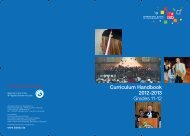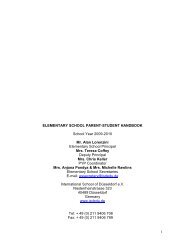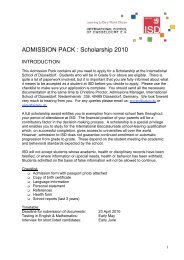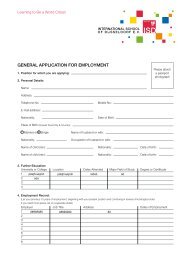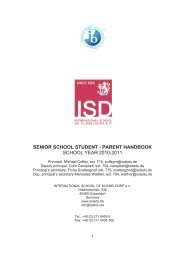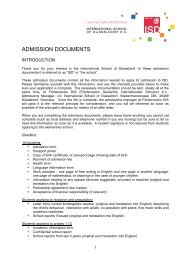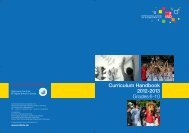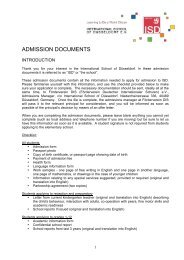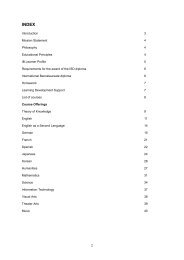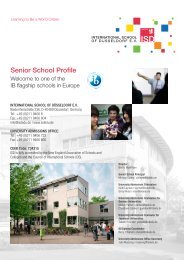Design Technology - International School of Duesseldorf
Design Technology - International School of Duesseldorf
Design Technology - International School of Duesseldorf
Create successful ePaper yourself
Turn your PDF publications into a flip-book with our unique Google optimized e-Paper software.
HUMANITIES<br />
PHILOSOPHY<br />
Humanities investigates the past, present and potential future interactions <strong>of</strong> people<br />
with each other and with the environment. Students examine local and international<br />
communities as well as their own cultures. Emphasis on global interdependence<br />
highlights individual differences and responsibilities, fostering tolerance and<br />
understanding. Our ultimate aim is to teach relevant knowledge and skills, which<br />
promote the social, intellectual and emotional development <strong>of</strong> each student<br />
PROGRAM<br />
The aim <strong>of</strong> the program is to encourage students to gain and develop knowledge,<br />
conceptual understanding, research skills, analytical and interpretive skills, and<br />
communication skills, as well as contributing to the development <strong>of</strong> the student as a<br />
whole. The program aims to encourage a respect for and understanding <strong>of</strong> the world<br />
around them, and provide a skills base for further study. This is achieved through the<br />
study <strong>of</strong> individuals, societies, and environments in a wide context, integrating<br />
historical, geographical, political, social, economic, religious, technological, cultural,<br />
and current perspectives.<br />
Key concepts include time, place and space, change, systems, and internationalism.<br />
Fundamental skills to be developed over the five years <strong>of</strong> the MYP include technical,<br />
analytical, problem-solving, and investigative skills.<br />
Aims: to encourage and enable the student to develop:<br />
• an enquiring mind<br />
• a sense <strong>of</strong> time and place<br />
• a respect and understanding <strong>of</strong> others’ perspectives, values, attitudes<br />
• awareness and understanding <strong>of</strong> people and cultures in a variety <strong>of</strong> places at<br />
different times<br />
• an understanding <strong>of</strong> the interactions and interdependence <strong>of</strong> individuals,<br />
societies, and their environments<br />
• an understanding <strong>of</strong> the causes and consequences <strong>of</strong> change through physical<br />
and human actions and processes<br />
• the skills necessary for the effective study <strong>of</strong> humanities<br />
• an understanding <strong>of</strong> contemporary humanities issues<br />
• a sense <strong>of</strong> internationalism and a desire to be proactive as a responsible global<br />
citizen<br />
• an awareness <strong>of</strong> the links with other subjects<br />
• a lifelong interest in, and enjoyment <strong>of</strong>, humanities.<br />
The objectives <strong>of</strong> the humanities program relate directly to four assessment criteria:<br />
knowledge <strong>of</strong> the subject matter, application and understanding <strong>of</strong> the key<br />
concepts, the development <strong>of</strong> skills, and the organization and presentation <strong>of</strong><br />
the material. Assessment is both summative and formative. Students will be<br />
assessed against criteria that clearly outline the learning objectives. Types <strong>of</strong><br />
assessment will include: unit tests, source analysis, essays, oral presentations,<br />
homework assignments and individual/group projects.<br />
32



